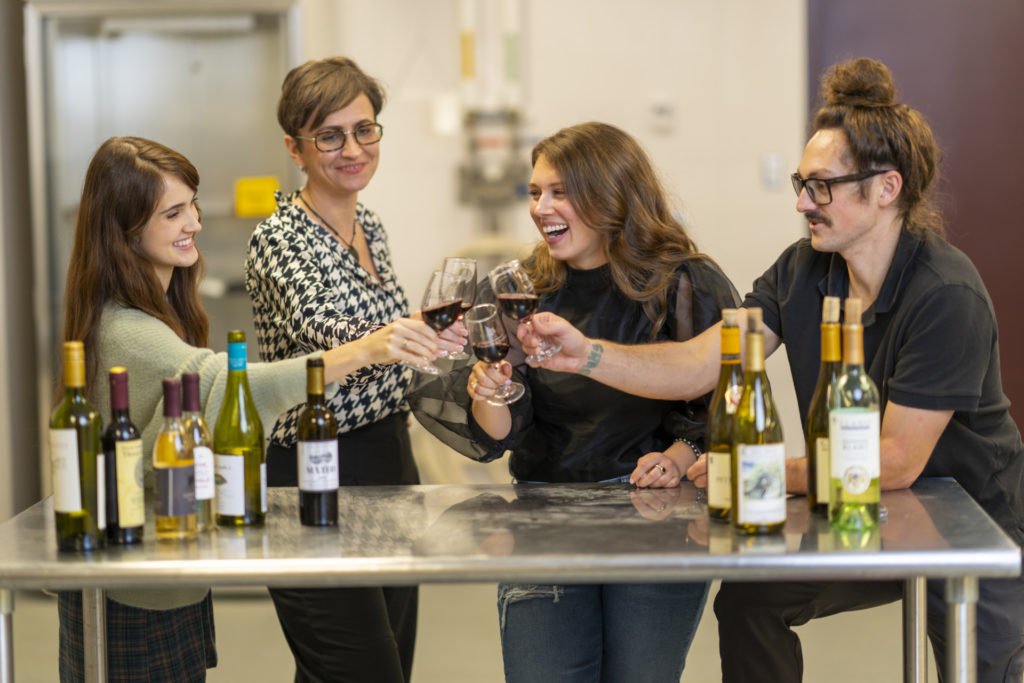Texas continues to play an increasingly important role in supplying quality, flavorful wine to help meet growing demand across the U.S.

Committed to strengthening the Texas grape and wine industry through sustainable practices, Texas A&M AgriLife accelerates research, prepares the future workforce and educates both farmers and consumers alike on wine production and wine consumption.
The experts across Texas A&M AgriLife work together to combine the horticultural expertise within the Department of Horticultural Sciences in the Texas A&M College of Agriculture and Life Sciences with the outreach expertise of the Texas A&M AgriLife Extension Service to support the strong, robust Texas wine industry.
“The department has a tripartite focus on sustainability, wellness and food security,” said Amit Dhingra, Ph.D., professor and head of the Department of Horticultural Sciences. “We are strategically positioning our research, teaching and Extension programs and resources to meet the challenges faced by our horticulture industries, including the wine grape industry, to help propel the multi-billion-dollar economic impact to the Texas economy.”
A strong start to enology and viticulture educational programming
“Sustainability starts at the vineyard with sustainable production and grape growing,” said Andreea Botezatu, Ph.D., assistant professor and AgriLife Extension enology specialist in the Department of Horticultural Sciences, Bryan-College Station.
Botezatu came to AgriLife Extension in 2017 and serves as the statewide enologist, providing expertise in the science of wine – including chemistry and microbiology of winemaking as well as arts and techniques for wine production.
Texas A&M AgriLife identified viticulture and enology as a key programmatic area after seeing explosive growth by both consumer and grower interests in wine grape production. Texas ranks among the top five wine-producing states in the U.S. with an annual economic value of $20.35 billion .
Since that time, a variety of diverse educational programming has been developed, as well as a research program that examines emerging issues, including the ongoing research at the Texas A&M AgriLife Extension Viticulture and Fruit Lab in Fredericksburg.
Additionally, the department launched a viticulture and enology certificate program to encourage interest in wine making or future careers in the wine industry. The program consists of 15 hours of study in viticulture, pre- and post-fermentation winemaking processes, wine etiquette and sensory evaluation.
For non-Texas A&M students, as well as winery owners, winemakers and wine lab technicians, Botezatu has created a successful series of webinars covering a wide range of enology-related topics.
Furthering sustainability through unripe grapes, verjus and grape pomace
Meanwhile, Botezatu and her graduate research assistants, including doctoral students Abby Keng and Cassie Marbach and master’s student Andrew Lyne, are exploring different research aspects of the wine industry.
“Currently, our lab has been focused on waste reduction at the winery,” she said. “Working with grape pomace, we are finding uses for the skins and the seeds left over after pressing.”
Another area of research focuses on identifying improved uses of verjus, or the acidic juice produced from unripe grapes. Verjus has unique culinary value as well as health-related properties and is broadly used across the world in places such as Iran, Turkey and other countries in the Transcaucasia region.


This research effort plays into the sustainable use of part of the grape crop that is dropped before ripening as part of crop thinning practice. On average, Texas wines have very low acidity, thus early crop thinning and the potential use of the under-ripened grapes to optimize acidity levels in some grape varieties could enhance quality of the wines, decrease costs, improve sustainability and create a potential new market for both the wines and stand-alone verjus products, Botezatu said.
“Currently, it’s considered waste and there is no particular use for these green grapes,” she said. “But we are finding that you can press them and blend with regularly produced wines to increase the acidity, at the same time improving the flavor and aroma of the wines.”
“We are also looking at this product from an economic perspective, to determine whether these potential practices would be financially beneficial to wineries.” she added.
Reducing the occurrence of cork/ haloanisole taint
Botezatu and her lab are also studying haloanisole taint, formerly known as cork taint, a global issue in the wine industry. Haloanisole taint has been associated with major economic losses due to odors and tastes in wine described as moldy, musty and wet cardboard.
“Several compounds called haloanisoles are responsible for this taint,” she said.
Specifically, these compounds include tricholoroanisole, TCA; tribromoanisole, TBA; tetrachloroanisole, TeCA; and tribromophenol, TBP.
“Our research focuses on the removal of TBA in wine,” she said. “TBA is caused when fungus that is present in the air mixes with bromine compounds that can be found on fire retardant treated wood. Our remediation method uses dried grape pomace (traditionally, a waste product) as a fining agent to remove TBA in wine.”
A fining agent is used to remove particles, clarifying and stabilize wine. Grape pomace would give winemakers another economical option.
Botezatu said preliminary testing was conducted using white wine spiked at 25 parts per trillion TBA and TCA, which is enough to severely taint a wine.
“Two different concentrations of dried grape pomace were added and allowed to sit for 48 hours,” she said. “At the addition of 5 grams per liter, we saw a 70% decrease in TBA. At the addition of 10 grams per liter, we saw a 74% decrease in TBA.”
Botezatu said they further believe that the taint has the potential to be much more prevalent in wineries than previously thought.
“So, we are planning on undertaking a statewide winery sampling effort in order to assess the real breadth of the issue,” she said.
In addition to haloanisole taint, her research also focuses on other aspects of wine faults, which are known as characteristics of wine that cause it to become undrinkable or greatly decrease its quality. Of particular interest is malolactic fermentation in high pH wines, such as the ones frequently seen in Texas and other hot wine producing regions around the world.
The enology lab investigates common causes, creates best practices for avoiding them and identifies remediation options.
The AgriLife Extension wine science program also periodically offers classes and workshops, hands-on demonstrations and wine evaluations designed to assist wine producers as they navigate these common issues. These events are usually posted in advance on their Facebook page.
Helping Texas wine producers ‘prosper, flourish’
“Overall, our hope is that wineries will come onboard and adopt some of these sustainable practices,” she said. “We certainly have to support them more in the future so they can prosper and flourish in this important component of our state economy.”
Botezatu said she also wants to communicate research results to Texas wine producers through conferences and publications.
“There’s a lot to be excited about with Texas wine and its future,” she said. “We are thrilled to be part of this by providing education and being of service to wine producers with our laboratory.”
-30-












